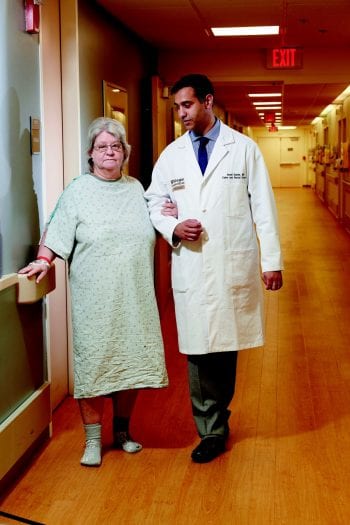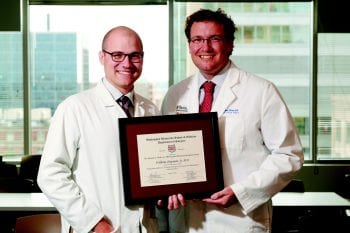Focus: Lower risk of VTEs

Patients with cancer and inflammatory bowel disease have a higher risk for developing venous thromboembolisms (VTEs), which can lead to increased hospitalizations. VTEs are blood clots that develop in a deep vein, such as in a leg, groin or arm. At Washington University, surgeon Aneel Damle, MD, who was a colorectal surgery fellow last year, worked with surgeon Matthew Silviera, MD, to identify contributing factors that lead to VTEs, with a goal of establishing a protocol to minimize these effects.
“Our 30-day VTE rate was over a percentage point higher than our expected rate of 2 percent,” says Damle. “We took an educated guess on which patient groups were more likely to develop VTEs and did a statistical analysis to see if, in fact, they had a higher rate.”
To see what influences VTE, Damle analyzed:
• Presence or absence of an epidural catheter
• Where patients came from: home, emergency department, outside hospital or nursing facility
• Days hospitalized before surgery
• How much they were made to walk after the operation
• Presence of a peripherally or centrally inserted venous catheter
Surgeons at Barnes-Jewish Hospital already were among the first to participate in the National Surgical Quality Improvement Program (ACS NSQIP®), an outcomes-reporting program to measure and improve the quality of surgical care. Colorectal surgeons previously studied ACS NSQIP® data on surgical site infections (SSIs) and reported successful results of an enhanced recovery-after-surgery protocol at the annual ACS NSQIP® meeting in 2016.
To combat VTEs, surgeons and nurses implemented countermeasures in March 2018, including a switch to a central line catheter shown to lower the VTE rate. In addition, they discovered that patients who were transferred from other hospitals were more than 10 times more likely to have a VTE, so a specialized screening protocol was implemented upon their arrival at Barnes-Jewish Hospital.
“Each patient also walks within four hours of arriving on the patient floor and then four times every day in the hospital,” says Damle. “We stress the importance of walking with patients and their families and chart it uniformly.”
Results of data collection from the first six months of the study were due in November 2018, and the team is optimistic that a reduction in VTEs will be noted, mirroring the results of the earlier SSI protocol.
Highlights

Nonoperative management of patients with stage II or III rectal cancer has been found to be more cost effective than surgery in patients with a complete clinical response to chemotherapy and radiation. The results, from a study by William Chapman Jr., MD, a general surgery resident, found that while nonoperative management increased the use of surveillance examinations and tests, overall costs were reduced. The study, which was based on a modeling technique known as decision analysis, won the 2018 Samuel A. Wells, Jr., MD Resident Research Award for Clinical Outcomes, Innovation and Education. Chapman worked with surgeon Matthew Silviera, MD, above right, on the project.
The colorectal surgery section is a Department of Surgery leader in developing an enhanced recovery after surgery (ERAS) protocol for patients and clinical staff. David Rosen, MD, a 2018 colorectal surgery fellowship graduate, and Matthew Silviera, MD, found use of thoracic epidural analgesia (TEA) as pain control did not reduce opioid use within the first 48 hours after surgery or hospital length of stay. They recommend avoiding routine use of TEA within the colorectal ERAS pathway.
Colorectal surgeon Radhika Smith, MD, has expanded the section’s colorectal surgery practice in south St. Louis County. Smith, who came to Washington University in March 2018, joins Colorectal Surgery Chief Matthew Mutch, MD, at Siteman Cancer Center-South County and Steven Hunt, MD, surgical co-director at the Center for Advanced Medicine-South County. Smith also leads the Center for Colorectal and Pelvic Floor Disorders (COPE Center) at Barnes-Jewish West County Hospital, which treats benign colorectal and pelvic floors disorders.